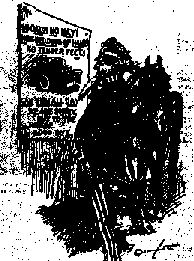

Some folks seem to think that, rather than this being the end of the
20th Century, it's the end of the 19th Century - an' some o' them young
whipper-snappers have been runnin' 'round town in them gas-buggie thangies,
an' they're scarin' the horses! (to say nothing of some of the town's elders).
Now you, dear reader, must decide: Are you going to learn how to drive and
become proficient at using the rapidly evolving technology of the Information
Age, that - for better and worse - will have as much impact in
the next several decades as the automobile had beginning a century earlier,
or are you going to cozy up to your loyal old hay-burner and grimly watch
as the world moves beyond you - much too fast for comfort?
Even more important in some ways: If you are a community or political leader,
are you going to learn enough to continue to lead? Or will you make increasingly
embarrassing decisions based on ignorance?
Or worse still, will you foolishly attempt to halt the future, as local
officials attempted in some communities at the end of the last century -
enacting local ordinances that required someone to walk 50 paces ahead of
any horseless carriage, ringing a bell and swinging a lantern? Just think
how ignorant those officials looked only a few years later, when automobiles
had become the norm - and those "leaders" quietly rescinded
their naive ordinances, hoping that the press and their constituents wouldn't
notice their lack of vision.
In many ways, the gas buggy's prelude to the 20th Century compares to how
today's developing computer networks will impact the 21st Century.
It's already begun. It has so many advantages that it won't be suppressed
- no more than horseless carriages were suppressed by those frightened,
rear-facing village "leaders." There are 30- to 60-million people
already using the networks worldwide, with about two-thirds on them in the
United States. And that number has been growing by 5% to 10% per month for
most of the 1990s, just as did the introduction of automobiles, radio and
telephones beginning around the end of the last century - and their
later counterpart, television, beginning in the 1950s.
Like the transportation revolution of the last century, and the later impacts
of television, pervasive computer networking will change the fabric of society.
Just as automobiles created suburbs where people could live far distant
from their work, the computer nets are beginning to complete that transition
- allowing more and more people to telecommute from shared community
tele-work centers, or even from home. (The latter can facilitate childcare
and enhance family cohesion - and also destroy it.)
But networking's greatest impact, by far, is that it is allowing individuals
a far more powerful voice in their community affairs than has ever been
possible before - which is a focus of this book.
And like automobiles - and also, many would say, television -
unfettered global personal communications has its dangers, sometimes real
but often imagined.
There are millions more killed by automobiles than were ever killed by horses
and their carriages, and vehicular air pollution is much more pervasive
and dangerous than horse droppings ever could have been. And thanks to television,
it is almost impossible for a homely politician or one with a poor speaking
voice to get elected to state or federal office - regardless of their
important qualifications.
Union leaders justifiably fear that telecommuting will expand managements'
use of computer-timed piecework and far-distant, lower-wage employees, and
that dispersed workers will make it more difficult to organize them (although
reasonable union access to employees via the company's electronic mail and
online union bulletin boards can significantly empower outreach and organizing
efforts).
And there are those who fear the "dangers" of allowing citizens
to conduct personal communications or electronically distribute information,
images and opinion that is anything other than completely appropriate for
the youngest of children - regardless of the fact that most of such
conversations and exchanges are completely protected when they use soundwave
speech or ink-based press.
Like those poor, ignorant village leaders, there has been a rash of current-day
"leaders" howling for government must become the thought police
throughout modern global communications. Disturbingly, some of the most
ardent demands for government control of voiceless speech and inkless press
are coming from the United States Congress and White House, just as they
have come from Communist China and religious zealots in the Middle East.
The other great fear - that has much more justification - is that
government will utilize the power of computers to conduct massive covert
surveillance of citizens and businesses. In 1994, Congress and President
Clinton enacted a half-billion-dollar national wiretap bill, and in 1995,
the Federal Bureau of Investigation used it to demand that all phone companies
install enough wiretap circuits to permit simultaneous surveillance of at
least one call per 400, nationwide - with no independent oversight
of its predictable abuses - saying that the Attorney General has determined
that such massive surveillance capabilities would be "essential"
for use by late 1998.
Counterbalancing these fears, like the personal transportation options opened
by automobiles a century ago, the computer nets empower individuals at state,
national and even international levels, in ways never previously possible
- via robust, timely, free and low cost personal and mass communications.
And globally-available, free and low cost, easy-to-use encryption software
can enhance personal privacy protection for files and communications in
ways never before possible (although various governments including the Clinton
administration are seeking to prohibit its use - thus limiting robust
privacy only to criminals).
Please note that there are two absolute prerequisites for a free society:
 Return to
The Hill on the Net
Return to
The Hill on the Net